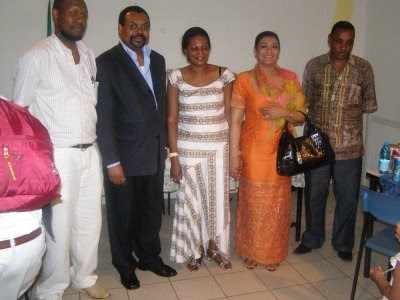
Mara baada ya kikao cha uchaguzi na ufunguzi wa tawi la jumuiya ya Watanzania Italy siku ya jumamosi tarehe 4/7/2009 ROME. kutoka kushoto, Ndugu ANDREW MHELA (KATIBU) MH.BALOZI KARUME, BI ZUHURA A.KIRRO (MWENYEKITI),MAMA BALOZI NA NDUGU AWADH AMBAE ALICHAGULIWA LUWA MUWEKA HAZINA. photo by GEORGE MAYAKA (Rome)





New exhibition on the Anti-Apartheid movement
By Natasha Dhumma
A new exhibition has opened at the Museum of London that celebrates the fiftieth anniversary of the Anti-Apartheid Movement.
The display, 'Forward to Freedom: The Anti-Apartheid Movement and the liberation of southern Africa', a collaborative effort between the Museum and the Anti-Apartheid Movement (AAM) Archives Committee seeks to show the brutality and injustice of the apartheid government as well as the powerful and imaginative campaigns against their actions and policy.
With material sourced from the now disbanded AAM's archives held at the Bodleian Library, University of Oxford, the display includes posters and promotional material from key campaigns, including the first leaflet from the Boycott Movement (which later became the Anti-Apartheid Movement) in 1959, letters from former prime ministers James Callaghan and Margaret Thatcher, testimonies from key activists and news footage and photographs depicting apartheid, resistance and anti-apartheid activities in both South Africa and London.
As the largest and most significant international solidarity movement, the Anti-Apartheid Movement was founded in London, bringing together and politicising people from diverse backgrounds. As the city has long been a stage for international and national protest, the Movement is therefore extremely relevant to British history. The exhibition explores the Movement's influence in this country, evident through resolute campaigning which led to a consumer boycott, the call for an end to the arms trade with South Africa, demonstrations against sporting fixtures with South Africa, and campaigns supporting political prisoners.
The Movement's creative and influential campaigning history is a powerful example of collective action and is therefore still extremely relevant in highlighting the success of grassroots activism. The exhibition reflects on the progress made by the Anti-Apartheid Movement over the last fifty years, its successor organisation Action for Southern Africa continues to campaign for the region's future by developing and promoting solidarity both in the UK and internationally.
The exhibition runs until 6 September and the Museum is hosting a number of events exploring the subject matter further. In addition, the themes of the exhibition will form a particular focus in its new galleries on Modern London to be launched in 2010, where the issues of race and rights will be central.
By Natasha Dhumma
A new exhibition has opened at the Museum of London that celebrates the fiftieth anniversary of the Anti-Apartheid Movement.
The display, 'Forward to Freedom: The Anti-Apartheid Movement and the liberation of southern Africa', a collaborative effort between the Museum and the Anti-Apartheid Movement (AAM) Archives Committee seeks to show the brutality and injustice of the apartheid government as well as the powerful and imaginative campaigns against their actions and policy.
With material sourced from the now disbanded AAM's archives held at the Bodleian Library, University of Oxford, the display includes posters and promotional material from key campaigns, including the first leaflet from the Boycott Movement (which later became the Anti-Apartheid Movement) in 1959, letters from former prime ministers James Callaghan and Margaret Thatcher, testimonies from key activists and news footage and photographs depicting apartheid, resistance and anti-apartheid activities in both South Africa and London.
As the largest and most significant international solidarity movement, the Anti-Apartheid Movement was founded in London, bringing together and politicising people from diverse backgrounds. As the city has long been a stage for international and national protest, the Movement is therefore extremely relevant to British history. The exhibition explores the Movement's influence in this country, evident through resolute campaigning which led to a consumer boycott, the call for an end to the arms trade with South Africa, demonstrations against sporting fixtures with South Africa, and campaigns supporting political prisoners.
The Movement's creative and influential campaigning history is a powerful example of collective action and is therefore still extremely relevant in highlighting the success of grassroots activism. The exhibition reflects on the progress made by the Anti-Apartheid Movement over the last fifty years, its successor organisation Action for Southern Africa continues to campaign for the region's future by developing and promoting solidarity both in the UK and internationally.
The exhibition runs until 6 September and the Museum is hosting a number of events exploring the subject matter further. In addition, the themes of the exhibition will form a particular focus in its new galleries on Modern London to be launched in 2010, where the issues of race and rights will be central.


